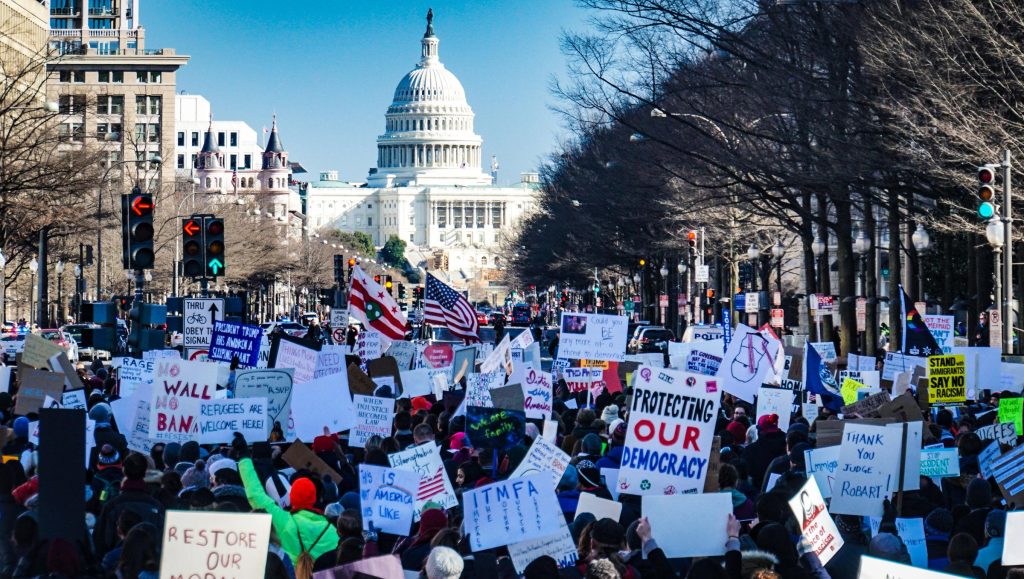

A Christian alternative to partisanship
This essay is a Preview, an occasional feature at Current and a companion to our Review features. In Previews we publish short excerpts from new and upcoming books that tell a good story and fit our general mission of commentary, reflection, judgment. This essay has been adapted with permission from the publisher from The Politics of the Cross: A Christian Alternative to Partisanship (paperback) by Daniel K. Williams. Eerdmans Publishing, 2024. 336 pp., $19.99
***
Harvard University history professor James Kloppenberg concluded his seven-hundred page global history of democracies by noting that democracies are more fragile than we might think. Most democratic experiments have failed. A democracy will succeed only if a critical mass of voters consistently engage in what he called “reciprocity”—that is, the willingness to sacrifice their own self-interest for the good of others. That has happened in America, he said, because of the nation’s liberal Protestant heritage. When that heritage disappears, democracy might disappear with it.
The willingness to sacrifice our own interests for the sake of others, which Kloppenberg said was the key to sustaining democracies, sounds very much like the message of Philippians 2:3–4: “Do nothing out of selfish ambition or vain conceit. Rather, in humility value others above yourselves, not looking to your own interests but each of you to the interests of others.”
While this passage might apply primarily to our behavior within the family of God, the attitude of giving up our own desires for the sake of others should characterize our actions in every sphere of life. If there is any group of voters who should take this message with them into the voting booth, it should be gospel-believing evangelical Christians. What if instead of being known as a political interest group, evangelical Christians in the United States were known as the people who cared enough about the nation and the well-being of their neighbors to sacrifice their own interests at the voting booth and cast ballots primarily with the good of others in mind?
But in fact, white evangelical Christians’ political behavior has generally not been characterized by this attitude. Rather than voting out of concern for the democratic order and the interests of all members of the community (especially the economically or racially marginalized who might be among those Jesus called the “least of these”), white evangelicals have generally entered the voting booth concerned first and foremost with a moral cause.
In past decades, that cause might have been a crusade against sexual immorality or Communism. Today the cause is most likely to be the religious liberty of Christians or, above all, the defense of unborn lives. These causes are not wrong. But there is a danger when cause-driven politics blinds us to other needs that our neighbors might have. Unborn lives are vitally important. But so are black lives. So are the lives of immigrant children detained on the border. Rather than engage in single-issue voting, we need to ask the questions: How can I sacrifice my own interests to do the most good for the cause of the kingdom of God? And how can I bring the kingdom of God to bear on my neighbor’s life by showing God’s love to my neighbor through my vote?
When we open our eyes to all the ways that the justice and mercy of the kingdom of God can be applied to the social issues around us, we will probably realize that the amount of evil in our society vastly exceeds what evangelical single-issue voting might be able to address. This has always been the case.
In eighteenth-century England or America, for example, an evangelical Christian with contemporary moral priorities might have assumed that the international slave trade—with its kidnapping and its sacrifice of human life—was the era’s most egregious social evil. But the eighteenth-century wars against Native Americans—which, in at least one case, involved the deliberate use of smallpox germs to infect a native population—were not much better. And dueling, which was legal in many places and which some thought was hardly wrong at all, was also a legitimate concern.
So which of these evils should Christians of the time have been most concerned about? A single-issue voter would have risked ignoring a lot of social evil for the sake of fighting one particularly egregious example of it. And if our hypothetical single-issue voter of the late eighteenth century had a contemporary evangelical political mindset, the voter probably would have expected moral regulation to solve problems that moral regulation alone, in fact, did not. This, of course, was the case with the international slave trade. When the kidnapping and transatlantic transport of African slaves was finally outlawed in the United States in 1808—thanks, in part, to people of conscience who spoke up—it was replaced by a domestic slave trade, with forced breeding of enslaved women and the sale of children on the auction block, that was arguably equally heinous.
Because there is never a moment when there is only one major sin in a society, an excessive focus on one single injustice can blind us to the amount of evil both in our present milieu and in the past. The contemporary legal abortion industry is certainly not the only time that Americans en masse have callously disregarded human life (including the lives of children), as a quick glance back at the slave trade and other evils of the eighteenth or nineteenth centuries might tell us. Nor is it the only example of callous disregard for human life today.
As important as the abortion issue is, if we are not careful, we can risk allowing a single-minded focus on this one evil to blind us to the many other contemporary instances of disrespect for human life and disregard for the people whom God has created in his image. And we also risk assuming that a quick and simple moral regulation will solve the problem. If outlawing the international slave trade did nothing to prevent the slave breeding and slave auctions that grew in its wake, we can probably assume that merely outlawing abortion, without a widespread heart change, will probably not be sufficient to solve the underlying problem. It may not even do much to protect human life.
But does this mean that we should passively accept the injustices around us? Not at all. Rather than be surprised at the extent of injustice in our society, a Christian who subscribes to the doctrine of original sin will expect that injustice will be pervasive. But a Christian who understands the power of the cross will also welcome the opportunity to bring the light of Jesus’s kingdom to bear on these injustices. We will do so with humility, knowing that we cannot do the Spirit’s work of changing hearts. But we will also do so with confidence, knowing that Jesus wants us to do good to all people (Gal. 6:10)—including the people who are affected by our votes.
As I try to show throughout this book, there are real policy solutions that might address the social evils of our generation (including abortion), but because these policy solutions do not conform to the regulatory paradigm that has long shaped white conservative evangelicals’ approach to politics, they may not be part of our current political agenda. The pursuit of these policy solutions may even require us to cross party lines at times and support candidates whose philosophy we disagree with, but whose policies we think will probably result in a reduction of injustice.
In the end, we as Christians may not come to an agreement on exactly which party offers the best opportunity to do good and promote justice at any given moment. We know that even at best, any political party will inadequately represent the priorities of God’s kingdom, and at worst, the party may be a form of Christian heresy. But when we transcend partisanship and seek the good of our neighbor, that may not matter, because our real loyalty will not be to a particular political party. We may worship with those who check a different box on the ballot than we do, but if both Democratic and Republican Christians vote with a Christlike determination to put others’ interests before our own, both will be practicing Christian politics.
True Christian politics is not about passing a litmus test or embracing a particular partisan identity. It is not even about subscribing to a particular political agenda. Instead, true Christian politics comes when we as individual followers of Jesus prayerfully make a determination to submit our voting choices to the lordship of Christ by sacrificing our own agenda for the sake of others and showing love to our neighbor through our policy choices.
Regardless of the political choices that we ultimately make, we know that when our choices are shaped by a selfless reflection of Jesus’s love for others, we will catch a glimpse of what it really means to bring the cross into politics. If we do this, as Kloppenberg suggested, we might play a role in preserving American democracy—which could be the modern equivalent of “seeking the peace and prosperity of the city” (Jer. 29:7). But more importantly, we will bear witness to the glory of the cross.
Daniel K. Williams is a historian working at Ashland University and the author of The Politics of the Cross: A Christian Alternative to Partisanship.
Image: Ted Eytan on Flikr
Having now a 4 year sample of the two, at present candidates, there is not much of a question, who
Promotes Christian Values, more.
One has bowed down to a Socialist/Globalist, – Agenda and one promoted an America, help each other
and Religious Freedom, Agenda.